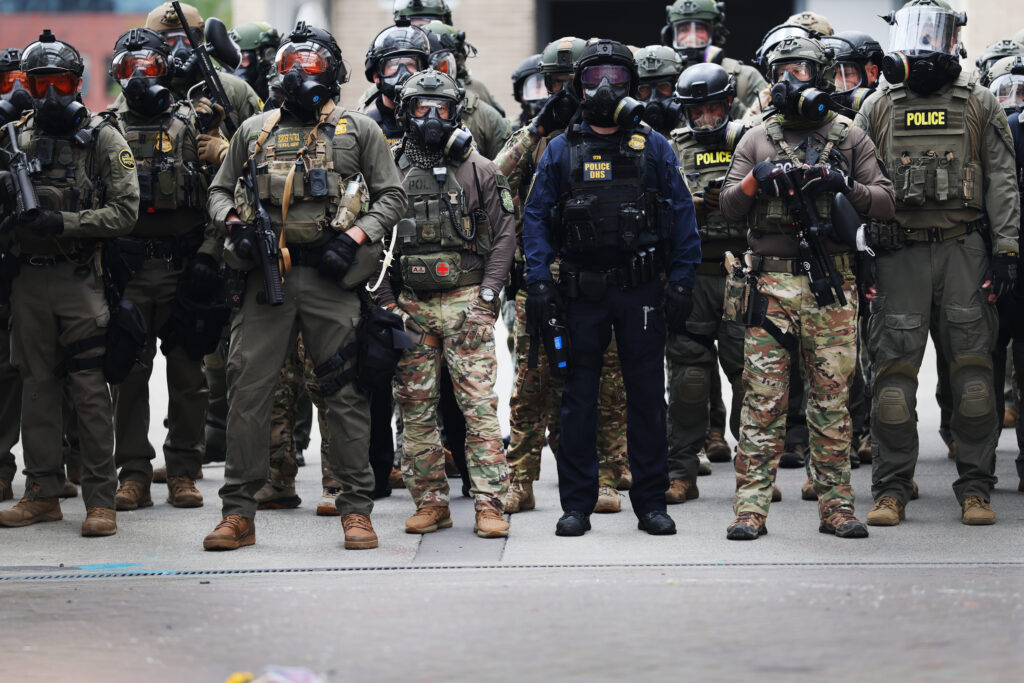Federal Judge Blocks Trump’s Seizure of Oregon National Guard for Portland Deployment

A federal judge Saturday blocked President Donald Trump’s call-up of the National Guard for a deployment in Portland, saying Trump’s actions were based on false claims and undermined Oregon’s sovereignty.
U.S. District Judge Karin Immergut, who was appointed by Trump in his first term, said Trump lacked legal authority last week when he attempted to federalize 200 members of the Oregon National Guard.
By seizing the troops without authority, the judge said Trump violated Oregon’s Tenth Amendment power to control its National Guard and interfered with the constitutional balance of power between the federal and state governments.
Through social media posts last weekend, Trump claimed to deploy troops to Portland, asserting that “domestic terrorists” had an Immigration and Customs Enforcement (ICE) facility in the “War ravaged” city “under siege.”
“I am also authorizing Full Force, if necessary,” Trump said in one of the posts announcing the deployment.
In response to the president’s social media posts, Secretary of Defense Pete Hegseth signed a memo claiming to federalize 200 members of the Oregon National Guard for at least 60 days.
Court declarations from Portland and Oregon state police earlier this week contradicted the Trump administration’s characterization of the city. Portland police officials testified that demonstrations outside of the facility have been largely peaceful and have only amounted to a few people gathering outside on a nightly basis.
Immergut said recent protests near an ICE building in southwest Portland could not constitute a “rebellion,” as the Trump administration claimed in attempting to federalize the state Guard troops.
“Here, the protests in Portland were not ‘a rebellion’ and did not pose a ‘danger of a rebellion,’ especially in the days leading up to the federalization,” Immergut wrote.
“The President’s determination was simply untethered to the facts,” the judge added.
Immergut also issued a warning to the Trump administration, saying attempting to federalize state Guard troops based on false claims risks upsetting the country’s fundamental tradition of civilian control of the military.
“This country has a longstanding and foundational tradition of resistance to government overreach, especially in the form of military intrusion into civil affairs,” Immergut wrote.
“This historical tradition boils down to a simple proposition: this is a nation of Constitutional law, not martial law. Defendants have made a range of arguments that, if accepted, risk blurring the line between civil and military federal power—to the detriment of this nation.”
Immergut’s order stayed Hegseth’s memo. Her ruling marked the second time a federal judge blocked Trump’s attempt to federalize Guard troops.
A federal judge in California also rejected Trump call-up for Guard troops for ICE-related unrest in Los Angeles earlier this year, though that ruling was later stayed by a three-judge panel for the Ninth Circuit Court of Appeals.
The panel determined Trump was within his authority to federalize Guard troops because conditions in LA were sufficient for the use of 10 U.S.C. 12406, an archaic statute that allows the president to mobilize the Guard when the country faces foreign invasion or rebellion, or when the president is unable to execute laws with regular resources.
In a hearing Friday, Department of Justice (DOJ) attorneys argued that the statute allowed the president to cite events that occurred months ago in an unrelated city in another state to deploy troops in Portland.
In her ruling, Immergut sharply rejected the DOJ’s argument, saying accepting it “would be to render meaningless the extraordinary requirements of 10 U.S.C. § 12406 by allowing the President to federalize one state’s National Guard based on events in a different state or mere speculation about future events.”
“In other words, violence elsewhere cannot support troop deployments here, and concern about hypothetical future conduct does not demonstrate a present inability to execute the laws using nonmilitary federal law enforcement,” the judge wrote.
The Trump administration will likely appeal Immergut’s order. Appeals from the District of Oregon are heard by the Ninth Circuit.
This story has been updated with additional details throughout.